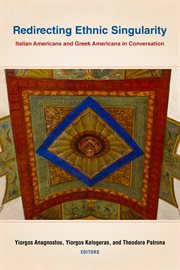Nonfiction
eBook
Details
PUBLISHED
Made available through hoopla
DESCRIPTION
1 online resource
ISBN/ISSN
LANGUAGE
NOTES
Promotes the understanding of Italian Americans and Greek Americans through the study of their interactions and juxtapositions. Redirecting Ethnic Singularity: Italian Americans and Greek Americans in Conversation contributes to U.S. ethnic and immigration studies by bringing into conversation scholars working in the fields of Italian American and Greek American studies in the United States, Europe, and Australia. The work moves beyond the "single group" approach-an approach that privileges the study of ethnic singularity--to explore instead two ethnic groups in relation to each other in the broader context of the United States. The chapters bring into focus transcultural interfaces and inquire comparatively about similarities and differences in cultural representations associated with these two groups. This co-edited volume contributes to the fields of transcultural and comparative studies. The book is multi-disciplinary. It features scholarship from the perspectives of architecture, ethnomusicology, education, history, cultural and literary studies, and film studies, as well as whiteness studies. It examines the production of ethnicity in the context of American political culture as well as that of popular culture, including visual representations (documentary, film, TV series) and "low brow" crime fiction. It includes analysis of literature. It involves comparative work on religious architecture, transoceanic circulation of racialized categories, translocal interconnections in the formation of pan-Mediterranean identities, and the making of the immigrant past in documentaries from Italian and Greek filmmakers. This volume is the first of its kind in initiating a multidisciplinary transcultural and comparative study across European Americans
Mode of access: World Wide Web







